India’s government loses key ally over UN resolution against Sri Lanka

Arun Sankar K./AP – Indian Tamil activists burn a Sri Lankan flag during a protest against Sri Lanka’s alleged wartime abuses, in Chennai, India on March 19, 2013. A key ethnic Tamil political party withdrew from the Indian government over its unmet demands that India amend the U.N. resolution to declare that Sri Lanka committed genocide against its Tamil population.
NEW DELHI — A key southern ally walked out of India’s national coalition government Tuesday, demanding that New Delhi push for tough amendments to the U.N. resolution against war crimes during the civil war in Sri Lanka four years ago.
The U.S.-sponsored resolution poses an acute domestic and foreign policy dilemma for New Delhi. It not only forces the Indian government to choose between upsetting a strategic neighbor such as Sri Lanka and a key government ally, but officials also worry that any intrusive global resolution may open the door for similar censure against India’s embarrassments in the disputed province of Kashmir.
The U.N. Human Rights Council will vote this week on the resolution, which calls on Sri Lanka to investigate war crimes.
New Delhi has been working with the international community to moderate the draft resolution’s language so that the government can support it without risking domestic fallout. An official in the government said the negotiations on the draft in Geneva “may go down to the wire.”
“India is an important ally of the U.S. They would not push us in the direction where things become difficult for us,” said the official, speaking on the condition of anonymity because he is not authorized to speak on the sensitive matter.
India supported a similar resolution against Sri Lanka at the U.N. council meeting last year.
“While India would not oppose some form of monitoring of the human rights situation in Sri Lanka, it would be against any intrusive move that violates their sovereignty,” said Kanwal Sibal, a former diplomat and foreign policy analyst. “Any role given for the international community has to have the consent of the Sri Lankan government.”
The DMK is based in the southern state of Tamil Nadu, which shares cultural affinity with the ethnic Tamil minorities in Sri Lanka. A decades-long Tamil fight for a separate homeland in Sri Lanka ended in a bloody and brutal war four years ago. In the final days of the civil war, tens of thousands of civilians were killed and tortured by the country’s military, who also denied them humanitarian aid, human rights groups say.
The United Nations has said that in April 2011, about 40,000 civilians may have died in indiscriminate shelling. Sri Lanka has denied the allegations and says the calls for an international probe amounts to interference.
Members of DMK want India to move an amendment that would toughen the resolution and include strong words such as “genocide.” The party also wants the Indian Parliament to condemn Sri Lanka.
“My question to the government of India is this: What are you waiting for?” DMK member T. K. S. Elangovan asked in Parliament on Tuesday. “Why is India a silent spectator?”
Human rights groups say the draft released late Monday appears considerably diluted.
“There is a lot of evidence in this draft resolution to clearly show the imprint of Indian influence,” said G. Ananthapadmanabhan, chief executive of Amnesty International India. “There is a significant downgrading of the international community’s concerns regarding human rights violations in Sri Lanka.”
The draft resolution places the onus on Sri Lanka to set up a mechanism for a credible, independent investigation. But Ananthapadmanabhan said that “it is disappointing that the resolution does not call for an international investigation.”
Finance Minister P. Chidambaram told reporters in New Delhi that the government is reviewing the DMK’s suggestions and the U.N. draft.
Chidambaram also stressed that the government is “absolutely stable” in spite of the withdrawal by 18 DMK members. The government hopes that other regional parties may support it from outside.